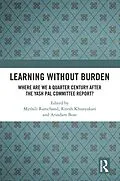This book looks at education reforms, planning and policy through an exploration of the Yash Pal Committee report (1993) in India, which made recommendations to improve the quality of learning while reducing cognitive burden on students.
It analyses the wide-ranging impact the report had on curriculum, pedagogy, teacher education reforms and the national policy on education. The book examines the legacy of the report, tracing the various deliberations and critical engagements with issues around literacy, language and mathematics learning, curriculum reforms and classroom practices, assessment and evaluation. It reviews contemporary developments in research on learning in diverse disciplines and languages through the lens of the recommendations made by the Learning without Burden report while engaging with challenges and systemic issues which limit inclusivity and access to quality education.
Drawing on extensive research and first-hand academic and teaching experience, this book will attract attention and interest of students and researchers of educational policy and analysis, linguistics, sociology and South Asian studies. It will also be of interest to policy makers, think tanks and civil society organisations.
Autorentext
Mythili Ramchand is currently Professor at the Centre for Education, Innovation and Action Research, Tata Institute of Social Sciences, Mumbai, India. Ritesh Khunyakari is Associate Professor and Chairperson at the Azim Premji School of Education at Tata Institute of Social Sciences (TISS), Hyderabad, India. Arindam Bose is Associate Professor at the Centre for Education Innovation and Action Research (CEIAR), TISS, Mumbai, India.
Inhalt
1. Introduction 2. Policy perspective to learning and burden 3. A psycho-social analysis of learning 4. Early language and literacy 5. Understand Language to Acquire It: Removing the Burden of Incomprehensibility 6. Logical learning and computational thinking 7. Learning through and with patterns 8. Visuo-Spatial learning 9. Recalling 'Sawaliram' to School: Role of questions in science learning 10. History, Politics and Curriculum Reform in a Postcolonial Democracy: A Long-Term View 11. The Demands of Ethical Learning and Character Development in our Changing Times 12. Learning in the arts and aesthetic development 13. Some aspects of learning with new media: enabling teaching and learning in the 21st century 14. Assessment and learning 15. Inclusion of Children with Diverse Learning Needs 16. Reforms in curriculum and textbooks to reduce the burden of learning: Challenges and Possibilities 17. Systemic reforms in education: Looking back to look forward
